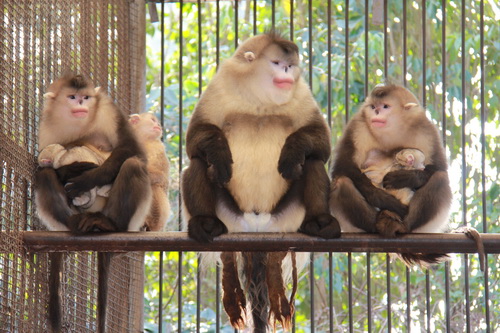
Two half-blood Yunnan snub-nosed monkeys (Rhisnopithecus bieti) were born in the Kunming Institute of Zoology, Chinese Academy of Sciences (KIZ) on the morning of February 21, 2012.
The two baby monkeys, now in excellent physical conditions, belong to the second generation of artificial propagated monkeys.
Yunnan snub-nose monkey is a world known endangered species. It only inhabits among the south edge of Himaraya-Hengduan mountainous regions. According to a recent survey, its population has decreased to 1600.
Yunnan snub-nose monkeys are not just bestowed with snub noses, but also with sexy red lips that make their faces look just like human. And they are also the only animals with lips except human. Besides, they are also the biggest monkeys in the world with an adult’s weight of more than 30kg. Unlike most of the other non-human primates that prefer to habitat in the rain forests of tropical areas, the Yunnan snub-nose monkeys tend to choose quite high altitude (3300-4100m) mountainous regions as their homes and keep reluctant to migrate to lower altitude regions even in the coldest season.
For animal phyletic classification, the Yunnan snub-nose monkeys belong to primates, cercopithecidae, golden monkey genus. Because of their special taxonomic status between old world monkeys and apes, they are of great significance for humans to understand human evolution.
The recorded earliest research about Yunnan snub-nose monkeys was a century ago and KIZ’s research on their biotope protection and artificial propagation can be tracked back to the 1980's. During all these years, KIZ has accumulated lots of experiences and finally achieved the great breakthrough in their artificial propagating. These successes not only provide necessary scientific evidences for the protection of Yunnan snub-nosed monkeys but also help increase its population.
The healthy propagation of a species demands either the diversities within a population gene pool or the frequent gene exchange between different populations. However, because of the shrinking number of Yunnan snub-nosed monkeys, they are stuck in the awkward situation of close breeding. Now, the researchers are making their efforts to alleviate this problem by strengthening seed source communications in protective areas.
